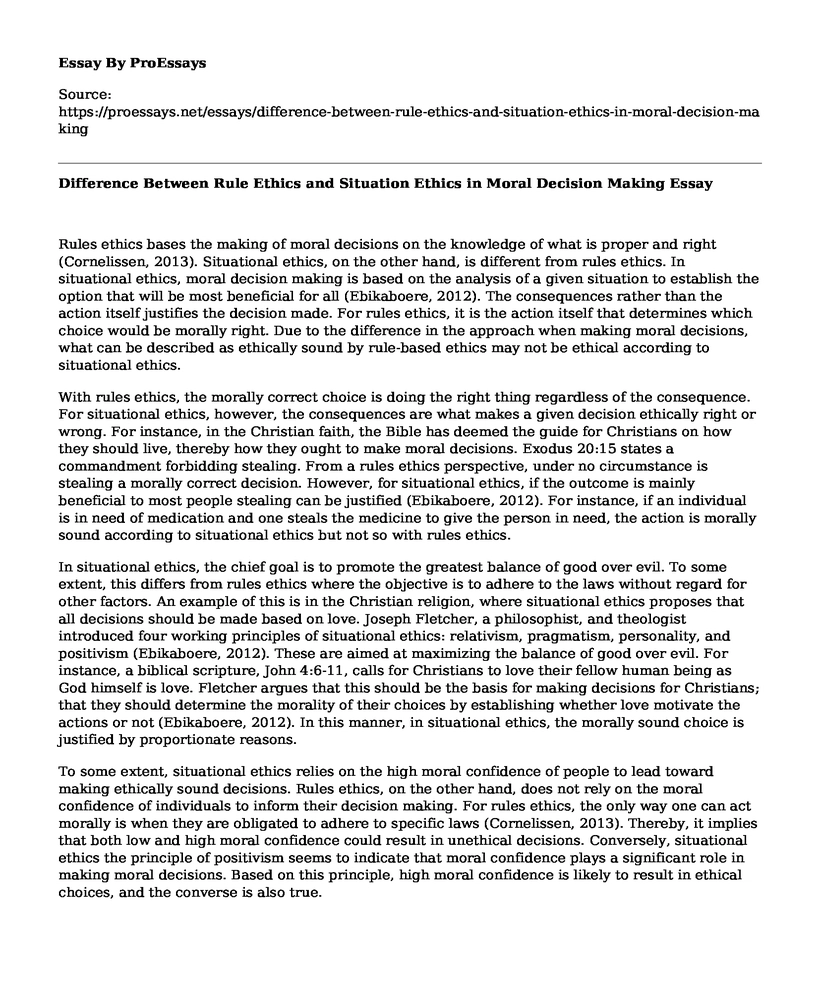Rules ethics bases the making of moral decisions on the knowledge of what is proper and right (Cornelissen, 2013). Situational ethics, on the other hand, is different from rules ethics. In situational ethics, moral decision making is based on the analysis of a given situation to establish the option that will be most beneficial for all (Ebikaboere, 2012). The consequences rather than the action itself justifies the decision made. For rules ethics, it is the action itself that determines which choice would be morally right. Due to the difference in the approach when making moral decisions, what can be described as ethically sound by rule-based ethics may not be ethical according to situational ethics.
With rules ethics, the morally correct choice is doing the right thing regardless of the consequence. For situational ethics, however, the consequences are what makes a given decision ethically right or wrong. For instance, in the Christian faith, the Bible has deemed the guide for Christians on how they should live, thereby how they ought to make moral decisions. Exodus 20:15 states a commandment forbidding stealing. From a rules ethics perspective, under no circumstance is stealing a morally correct decision. However, for situational ethics, if the outcome is mainly beneficial to most people stealing can be justified (Ebikaboere, 2012). For instance, if an individual is in need of medication and one steals the medicine to give the person in need, the action is morally sound according to situational ethics but not so with rules ethics.
In situational ethics, the chief goal is to promote the greatest balance of good over evil. To some extent, this differs from rules ethics where the objective is to adhere to the laws without regard for other factors. An example of this is in the Christian religion, where situational ethics proposes that all decisions should be made based on love. Joseph Fletcher, a philosophist, and theologist introduced four working principles of situational ethics: relativism, pragmatism, personality, and positivism (Ebikaboere, 2012). These are aimed at maximizing the balance of good over evil. For instance, a biblical scripture, John 4:6-11, calls for Christians to love their fellow human being as God himself is love. Fletcher argues that this should be the basis for making decisions for Christians; that they should determine the morality of their choices by establishing whether love motivate the actions or not (Ebikaboere, 2012). In this manner, in situational ethics, the morally sound choice is justified by proportionate reasons.
To some extent, situational ethics relies on the high moral confidence of people to lead toward making ethically sound decisions. Rules ethics, on the other hand, does not rely on the moral confidence of individuals to inform their decision making. For rules ethics, the only way one can act morally is when they are obligated to adhere to specific laws (Cornelissen, 2013). Thereby, it implies that both low and high moral confidence could result in unethical decisions. Conversely, situational ethics the principle of positivism seems to indicate that moral confidence plays a significant role in making moral decisions. Based on this principle, high moral confidence is likely to result in ethical choices, and the converse is also true.
Conclusion
In summary, rules ethics claims that people should work for laws whereas in situational ethics laws should benefit people. It is this fundamental difference between the two that results in the difference between them regarding the making of moral decisions. In situational ethics, the morality of a decision is determined by its consequence while in rule-based ethics it is based on whether the act is lawful or not.
References
Cornelissen, G., Bashshur, M. R., Rode, J., & Le Menestrel, M. (2013). Rules or Consequences? The Role of Ethical Mind-Sets in Moral Dynamics. Psychological Science, 24(4), 482-488. doi:10.1177/0956797612457376
Ebikaboere, O. (2012). Ethical Contextualism: An Appraisal of Situation Ethics. Lambert Academy Publishing. Retrieved from http://eprints.covenantuniversity.edu.ng/2408/1/Ethical%20Contextualism.pdf
Cite this page
Difference Between Rule Ethics and Situation Ethics in Moral Decision Making. (2022, Jun 17). Retrieved from https://proessays.net/essays/difference-between-rule-ethics-and-situation-ethics-in-moral-decision-making
If you are the original author of this essay and no longer wish to have it published on the ProEssays website, please click below to request its removal:
- Paper Example on the Results of DISC Assessment
- Paper Example on Ethical Leadership Working with Older Donors
- Ear Pod That Translates Languages Paper Example
- Paper Example on Chiquita's Struggles: Mass Production of Bananas in Colombia
- Research Paper on Project Management and Leadership: Keys to Project Success
- Shareholder vs. Stakeholder Theory: A Corporate Governance Debate - Essay Sample
- Secure Health Records: Ensuring Patient Privacy and Safety - Paper Example







